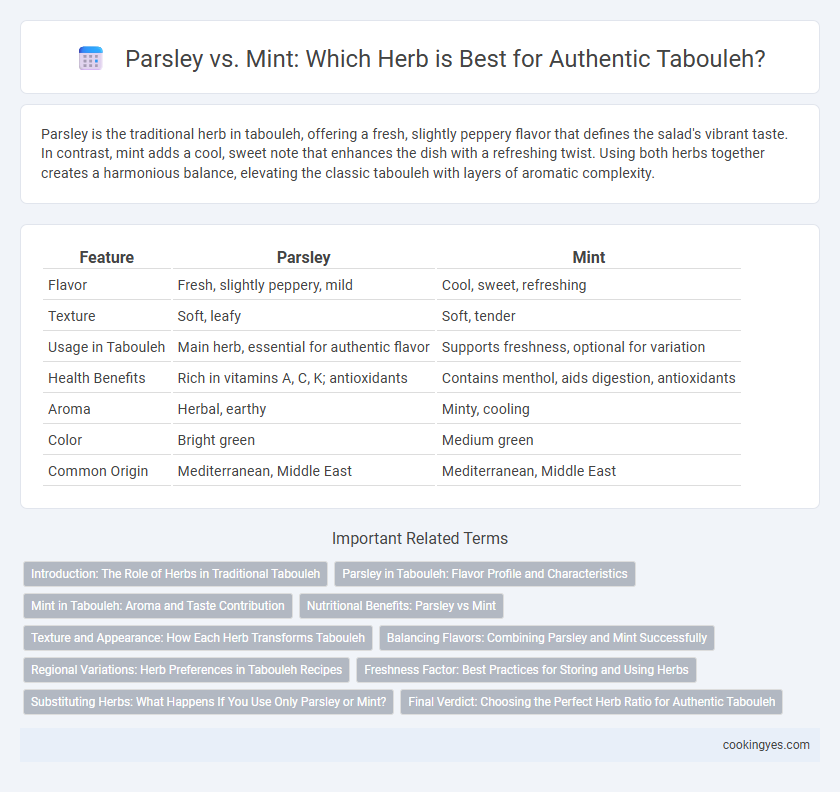Parsley is the traditional herb in tabouleh, offering a fresh, slightly peppery flavor that defines the salad's vibrant taste. In contrast, mint adds a cool, sweet note that enhances the dish with a refreshing twist. Using both herbs together creates a harmonious balance, elevating the classic tabouleh with layers of aromatic complexity.
Table of Comparison
| Feature | Parsley | Mint |
|---|---|---|
| Flavor | Fresh, slightly peppery, mild | Cool, sweet, refreshing |
| Texture | Soft, leafy | Soft, tender |
| Usage in Tabouleh | Main herb, essential for authentic flavor | Supports freshness, optional for variation |
| Health Benefits | Rich in vitamins A, C, K; antioxidants | Contains menthol, aids digestion, antioxidants |
| Aroma | Herbal, earthy | Minty, cooling |
| Color | Bright green | Medium green |
| Common Origin | Mediterranean, Middle East | Mediterranean, Middle East |
Introduction: The Role of Herbs in Traditional Tabouleh
Parsley serves as the primary herb in traditional Tabouleh, offering a fresh, slightly peppery flavor that defines the dish's bright and vibrant profile. Mint, while often added for a cooling contrast, plays a secondary role that enhances the overall freshness without overpowering the parsley. The combination of these herbs balances the flavor complexity, contributing to the authentic taste and aroma of classic Tabouleh.
Parsley in Tabouleh: Flavor Profile and Characteristics
Parsley in tabouleh offers a fresh, vibrant flavor with slightly peppery and citrusy notes, essential for achieving the dish's signature brightness. Its finely chopped texture adds a light, herbaceous crunch that balances the soft bulgur and juicy tomatoes, enhancing the overall mouthfeel. Penned as the cornerstone herb in traditional tabouleh recipes, parsley delivers a clean, aromatic base that complements lemon juice and olive oil perfectly.
Mint in Tabouleh: Aroma and Taste Contribution
Mint in tabouleh enhances the salad's bright, refreshing aroma with its cool, slightly sweet fragrance, providing a vibrant contrast to the earthy parsley. Its crisp flavor adds a subtle cooling effect that balances the lemon juice's acidity and the bulgur's nuttiness. Incorporating mint elevates the overall taste profile, making tabouleh more aromatic and flavorful while complementing the traditional herbs.
Nutritional Benefits: Parsley vs Mint
Parsley in tabouleh offers high levels of vitamins A, C, and K, along with antioxidants that support immune health and bone strength. Mint provides essential nutrients such as vitamin A and small amounts of calcium and iron, aiding digestion and offering anti-inflammatory properties. Both herbs contribute unique nutritional benefits, but parsley generally delivers higher concentrations of vitamins important for overall health.
Texture and Appearance: How Each Herb Transforms Tabouleh
Parsley gives tabouleh its signature coarse, leafy texture and vibrant green color, creating a visually fresh and herbaceous dish, while mint adds a finer, more delicate texture with a brighter, almost translucent hue. The robust, slightly curly leaves of parsley provide a heartier bite that balances the grainy bulgur, whereas mint's soft, smooth leaves deliver a refreshing contrast without overpowering the dish. Combining both herbs can enhance the tabouleh's complexity, offering layers of texture and a visually appealing mosaic of deep and light greens.
Balancing Flavors: Combining Parsley and Mint Successfully
Balancing flavors in tabouleh hinges on the fresh, peppery brightness of parsley paired with the cool, aromatic notes of mint, creating a refreshing contrast that elevates the dish. Parsley provides the robust herbal foundation, while mint adds a subtle sweetness and complexity, preventing any single herb from overpowering the salad. Precise proportions--typically a larger quantity of parsley to a smaller amount of mint--ensure a harmonious blend that enhances the traditional Levantine flavor profile.
Regional Variations: Herb Preferences in Tabouleh Recipes
Parsley is the essential herb in traditional Lebanese tabouleh, prized for its fresh, slightly peppery flavor that defines the dish's vibrant green color and taste. In contrast, some Syrian and Palestinian variations incorporate mint to add a cooling, aromatic quality, reflecting local palate preferences and seasonal herb availability. These regional differences highlight how tabouleh recipes adapt herbs to balance freshness and flavor intensity within Levantine cuisine.
Freshness Factor: Best Practices for Storing and Using Herbs
Fresh parsley and mint both contribute vibrant freshness to tabouleh, but properly storing them enhances their flavors and shelf life. To maintain their crisp texture and bright taste, wrap the herbs loosely in a damp paper towel and store them in an airtight container inside the refrigerator. Frequent trimming of the stems and avoiding moisture accumulation prevents wilting, ensuring optimal freshness in every tabouleh serving.
Substituting Herbs: What Happens If You Use Only Parsley or Mint?
Using only parsley in tabouleh provides a fresh, slightly peppery flavor that maintains the traditional brightness of the dish, while mint alone introduces a cooling, sweet undertone that significantly alters the classic taste profile. Parsley offers essential antioxidants and vitamin C, contributing to the dish's nutritional value, whereas mint adds a digestive aid component but lacks parsley's vibrant texture and depth. Substituting exclusively with either herb changes the balance of aromas and can shift tabouleh from a savory herb salad to a more herbaceous or refreshing side dish, impacting overall flavor harmony.
Final Verdict: Choosing the Perfect Herb Ratio for Authentic Tabouleh
Parsley provides the fresh, citrusy base essential to authentic tabouleh, while mint adds a subtle cooling contrast that enhances overall flavor complexity. The perfect herb ratio typically leans heavily on flat-leaf parsley, comprising about 70-80%, with 20-30% fresh mint to balance brightness and aroma. Achieving this balance highlights traditional Levantine flavors and elevates the salad's refreshing quality.
Parsley vs Mint for Tabouleh Infographic

 cookingyes.com
cookingyes.com